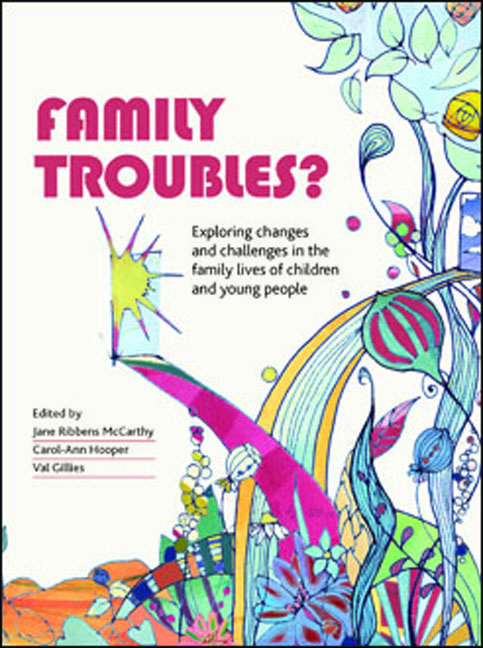Book contents
- Frontmatter
- Contents
- Notes on contributors
- Foreword
- Preface
- 1 Troubling normalities and normal family troubles: diversities, experiences and tensions
- Part One Approaching family troubles ? Contexts and methodologies :Introduction to Part One
- Part Two Whose trouble ? Conteste d definitions and practice: Introduction to Part Two
- Part Three The Normal, The Troubling And The Harmful?: Introduction to Part Three
- Part Four Troubles and transitions across space and culture: Introduction to Part Four
- Part Five Working With Families: Introduction to Part Five
- Index
Preface
Published online by Cambridge University Press: 07 September 2022
- Frontmatter
- Contents
- Notes on contributors
- Foreword
- Preface
- 1 Troubling normalities and normal family troubles: diversities, experiences and tensions
- Part One Approaching family troubles ? Contexts and methodologies :Introduction to Part One
- Part Two Whose trouble ? Conteste d definitions and practice: Introduction to Part Two
- Part Three The Normal, The Troubling And The Harmful?: Introduction to Part Three
- Part Four Troubles and transitions across space and culture: Introduction to Part Four
- Part Five Working With Families: Introduction to Part Five
- Index
Summary
As the everyday family lives of children and young people come to be increasingly defined as matters of public policy and concern, it is important to raise the question of how we can understand the contested terrain between ‘normal’ family troubles and troubled and troubling families. This edited collection is the outcome of a two-day colloquium held in London, in July 2010, to promote dialogue between researchers addressing mainstream family change and diversity in everyday lives, and those specialising in specific problems that prompt professional interventions, and to consider the implications for policymakers, service users and practitioners.
The Colloquium grew from the editors’ friendship and academic conversations over many years, through which we became aware of (and intrigued by) a practical divide that tends to occur – in terms of the conferences we attend, the networks we belong to, the questions that shape research and the literatures that are discussed in these various sites – between those social scientists researching and writing about changes in ‘mainstream’ family lives, and those researching and writing about family lives that are considered to be ‘problematic’ and subject to direct policy and professional interventions. Yet, much research on mainstream families incorporates data about how ‘troubles’ feature in the lives of research participants, although this may not appear in the main outputs of such studies. Similarly, applied research on troublesome family issues may incorporate data on how such family members experience the kinds of change and diversity addressed by ‘mainstream’ researchers and how they carry on, and ‘normalise’, their everyday lives in the context of trouble. For the Colloquium, we invited such researchers to take a fresh look at their data to explore how ‘troubles’ feature in ‘normal’ families, and how the ‘normal’ features in ‘troubled’ families. The response to our call for papers brought forward enthusiastic participants from across the globe, offering to address these questions by drawing on research on a wide range of substantive topics, including infant care, sibling conflict, divorce, parental bereavement, disability, illness, migration and asylum-seeking, substance misuse, violence, kinship care, and forced marriage.
Key questions that we asked participants to consider included:
• If change (whether experienced suddenly or incrementally) is a ‘normal’ feature of family lives and the life course, at what point does it become experienced, or perceived, as troublesome, and why?
- Type
- Chapter
- Information
- Family Troubles?Exploring Changes and Challenges in the Family Lives of Children and Young People, pp. xv - xviPublisher: Bristol University PressPrint publication year: 2013

